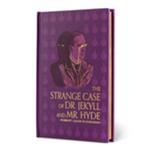What a study in contrasts is the friendship between Henry Jekyll and his boon companion, Edward Hyde. Where Jekyll is a handsome and respected man of science, Hyde is a surly and brutish misanthrope. Nevertheless, Jekyll allows Hyde free access to his home and laboratory and, surprisingly, made him the sole beneficiary of his will. Given the closeness of their bond, it seems peculiar that no one has ever seen the two men together in public. And yet they share a remarkable chemistry… First published in 1886, The Strange Case of Dr. Jekyll and Mr. Hydein the psychological horror genre, it explores themes of identity, human evil, and the societal pressures that influence personal choices. Historically, it reflects the Victorian anxiety about the public and private spheres and the fears of degeneration prevalent in the late nineteenth century. Dr. Jekyll and Mr. Hyde challenges the notion of inherent goodness and questions the possibility of fully understanding one’s own multiplicity and capacity for evil. Its enduring appeal lies in its profound philosophical questions about the essential conflict within human nature.

The strange case of Dr. Jekyll and Mr. Hyde
ISBN: 9781454957287
Format: Hardback
Publisher: Union Square & Co (ADS)
Origin: US
Release Date: February, 2025


